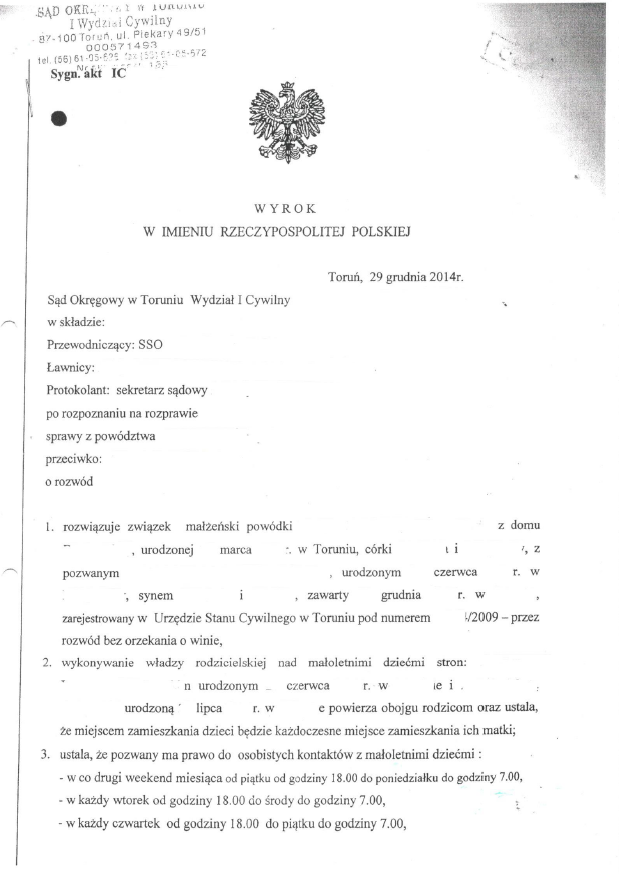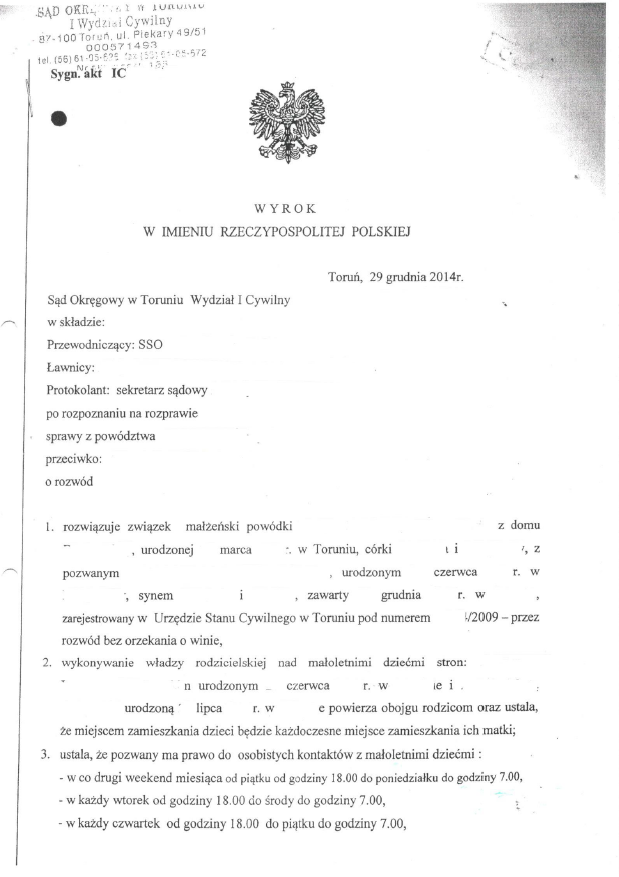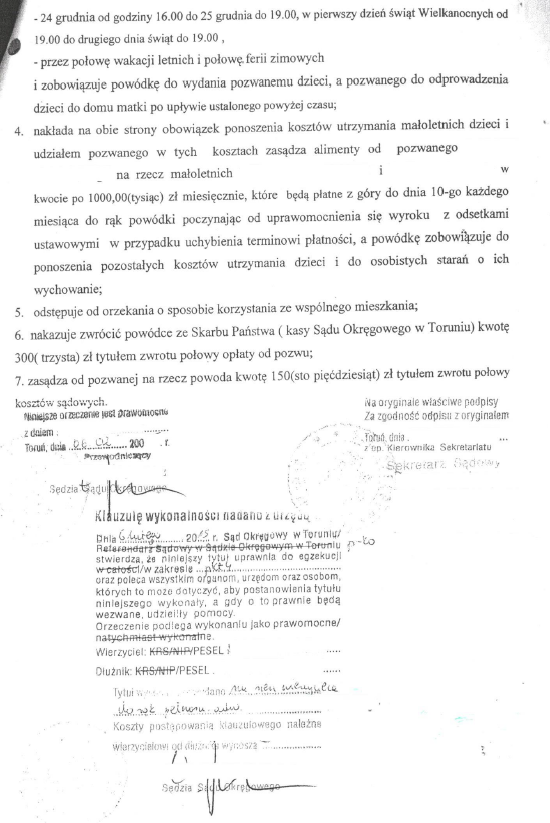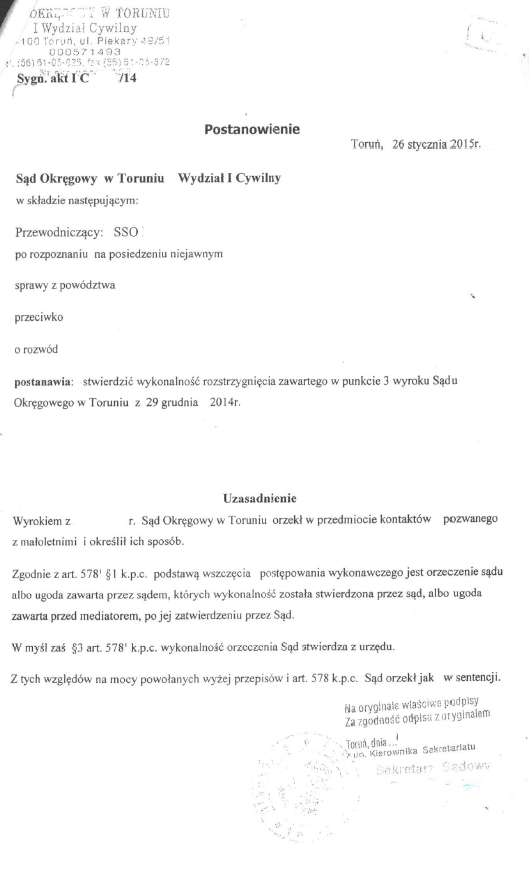POLISH DIVORCE JUDGMENT – RULES OF DIVORCE IN POLAND
publication date: December 5, 2022

The form of the Polish divorce judgment contains its permanent scheme.
First of all, the document contains its universal elements such as:
– case number;
– national emblem;
– the phrase: “JUDGMENT ON BEHALF OF THE REPUBLIC OF POLAND”;
– the date of the judgment;
– designation of the court and the composition of the court and the recording clerk;
– designation of persons who are divorcing and on whose initiative the divorce case is made;
– a clear indication that the judgment is the resolution of a COURT CASE FOR DIVORCE.
Secondly, the so-called operative part of the judgment, i.e. the substantive decision by the court about the fate of a given family, i.e.:
– first of all, the court indicates whether the case ends in divorce or not and by whose fault;
– next, the court regulates the manner in which parental authority is exercised, i.e. how divorcees will make decisions about children;
– in the third place there is always a description of the contacts between the child and the spouse who will not have children with them permanently;
– in the fourth place, the judgment always has the court’s decision on how the parents will finance the children (maintenance);
– the fifth place is always the issue of the rules of using a shared apartment.
In the further part of the judgment, the method of determining the costs is described, i.e. who and for what must be paid so that the court can settle the divorce case.
Then, a specific printout of the judgment (the operative part of the judgment) receives a specific enforcement clause regarding property issues, which is performed by the bailiff for the person concerned.
For the compulsory execution of those parts of the judgment in which the bailiff does not act, the court shall additionally attach to the judgment a decision on the declaration of enforceability.
The above two clauses are, of course, only added when the judgment is final (valid in the meaning that there has not been filed an appeal against it or the appeal has been already adjudicated).
For example, a divorce judgment issued in Poland, in a situation where the court rules on the dissolution of the marriage relationship without adjudicating on fault, brought by one of the spouses, at the same time granting parental authority to one of the parties and deciding on the place of residence of a minor child or children, as well as on the rules of the defendant’s contact with them, the issue of incurring the maintenance costs of a minor child or children, alimony and, optionally, the use of a shared flat contains the following elements.
In the first point, the court states the dissolution of the marriage between the plaintiff and the defendant, enters their data, i.e. name and surname, in the case of a woman also maiden name, date (day, month, year) and place of birth, and parents’ names. Then, in the same point, the court puts the date (day, month, year) and place of marriage. At the end, it indicates whether the marriage is dissolved with or without a verdict of fault of one of the spouses.
In the second point, the court decides on the exercise of parental authority over a minor child or children, also provides the parents’ data, i.e. date (day, month, year) and place of birth.
If the court entrusts parental authority to both parents, it also determines each place of residence of the minor child or children, and in the next point it specifies the scope of the rights of personal contact with them of the spouse with whom they do not live, e.g. every other weekend from Friday from 4:00 pm to Sunday until 20:00 and every Wednesday from 18:00 to Thursday until 7:00. The court may also determine the duration of the children’s stay with the other parent during holidays, e.g. on December 24 from 4:00 pm to December 25 until 6:00 pm, on the first day of Easter and on the second day of Christmas until 19:00 and for half of the summer holidays and half of the winter holidays. In the same point, the court obliges the spouse with whom the minor child or children live to hand them over, and the other parent to accompany the child or children to each place of their residence, determined by the court in point two, after the above-mentioned time has elapsed.
In the fourth point, the court imposes on both parties the obligation to bear the costs of maintaining minor children and orders alimony from the defendant for minors, specifying the names and surnames of the children, specifying the amount and the rules for payment of benefits, e.g. PLN 1,000, monthly, in advance, by the 10th day of each month to the claimant. The obligation to pay benefits becomes due when the judgment becomes final. The court also rules on the obligation to pay interest accrued in the event of failure to meet the payment deadline, and the plaintiff obliges himself to bear the remaining costs of maintaining the children and to make personal efforts to raise them.
The court may, but does not have to, rule on the use of a shared flat. Information on the withdrawal from adjudication in this respect is included in the judgment in point five.
When necessary, the court in points six and seven decides on the obligation to reimburse the claim fees and court costs, e.g. orders the plaintiff to return PLN 500 from the State Treasury, the value is given in figures and words.
The original of the judgment shall be stamped at the bottom with the date (day, month, year) on which the judgment becomes final. The seal also bears the date of its submission and the signature of the Chairman of the adjudicating panel.
The original also contains an enforcement clause issued ex officio, in which the date (day, month, year) and the competent court are indicated, stating the right to enforcement, in whole or in the indicated scope, and recommends to all authorities, offices and persons to whom it may concern to comply with the provisions of this judgment and, when legally required to do so, to provide assistance. In the clause that follows, the judgment is deemed to be enforceable as final or immediately enforceable. Information about the awarded party, his Tax Identification Number or PESEL (Polish Identification Number) should be entered, below the same scope of information appropriate for the obliged party. The costs of the clause-affixing proceedings are also given, if they are due to the creditor by the debtor. The clause is signed by the chairman of the adjudicating panel.
The above elements, which contain the data of the participants in the proceedings, are not included in the copy of the original, it only contains a certificate of originality confirmed by the signature of the Secretary of the Court.
In turn, the order stating the feasibility of the divorce indicates: the court adjudicating on the case, the chairman of the bench, information about the status of the court sitting (closed or open), the name and surname of the plaintiff, of the defendant and the subject matter of the action. For example, the court declares the enforceability of the decision contained in the relevant paragraph of the judgment and states the date and place of its delivery.
An example of a divorce judgment in Poland
In the upper left corner of the judgment, the seal of the court competent to consider the case is placed, e.g.: Regional Court in X, 10th Civil Division, and the case reference number.

Below, there is the emblem of the Republic of Poland with the sentence which reads: “Judgement on behalf of the Republic of Poland” and the date of the judgment (day, month, year) and the place of its issuance.
Then, information about the court that issued the judgment and the adjudicating panel is given:
- Regional Court in [the city], 10th Civil Division;
- Presiding judge: Regional Court Judge [X];
- Jurors: X, Y.
As a rule, the adjudicating panel consists of three persons: a judge and two lay judges.
- Recorder: court secretary X.
Below there is a sentence which reads as follows: “After adjudicating the case filed by X (plaintiff’s name) against Y (defendant’s name) for divorce at the hearing.”

The court then decides in respective points.
- The Regional Court in the town of X, Civil Division, dissolves the marriage of the plaintiff [X], born – date X (day, month, year) in the town of X, son/daughter of X and Y (only the names of the plaintiff’s parents), with defendant X, born – date X (day, month, year) in the town of X, son/daughter of X and Y (only the names of the parents of the defendant), concluded – date of marriage (day, month, year) in the town of X, registered at the Registry Office in the town of X under the number xxxx/xxxx – by divorce without adjudication on fault,
- The Regional Court entrusts the exercise of parental authority over a minor child, e.g. Jan Stanisław Nowak, born – date (day, month, year) in town X, to both parents and determines that the child’s place of residence is any place of residence of one of the parents,
- The court determines that the defendant has the right to personal contacts with the minor child:

for example:
– every second weekend of the month from Friday from 7:00 to Sunday until 20:00,
– every Tuesday from 19:00 to Wednesday until 7:00,
– every Thursday from 19:00 to 7:00,
– 24 December from 16:00 to 25 December until 16:00, on the first day of Easter from 19:00 to the second day of Easter until 19:00,
– half of the summer holidays and half of the winter holidays.
And I oblige the plaintiff to hand over the children to the defendant, and the defendant to escort the children to their place of residence each time, as determined by the court, after the time specified above has elapsed,
- The court imposes an obligation on both parties to bear the maintenance costs of a minor child/children and awards alimony from defendant X for minor child Y in the amount of PLN 1,000.00 (one thousand) per month, which will be paid in advance by the 10th of each month into the hands of the plaintiff, starting from the judgment becoming final with statutory interest in the event of failure to meet the payment deadline, and the plaintiff obliges himself to bear the remaining costs of maintaining the children and to make personal efforts to raise them.
- The court decides or refrains from adjudicating on the manner of using a shared flat,
- The court may order the claimant to return the amount of X (in words: the amount) of zlotys as a refund of half of the fees from the claim;
- The court may order the defendant to pay to the plaintiff the amount of X (in words: PLN) as reimbursement of half of the court costs.
Below, on the left-hand side, the chairman of the adjudication bench places a seal, certified by his own signature and stating that the ruling is valid as of – date (day, month, year) and the date and place of affixing the seal (city X, day, month, year). If a copy is issued, next to it, on the right-hand side, the Court Secretary affixes a stamp certifying the compliance of the certified copy with the original as well as the date and place of stamping (city X, day, month, year).
Then, an enforcement clause issued ex officio is placed, which confirms that the judgment can be enforced and entitles the person to apply to the bailiff.
Content of the clause:
On – date (day, month, year) The Regional Court in X / Court Referendary in the Regional Court (delete as appropriate) in X, states that this title entitles to enforcement in full / to the extent (delete as appropriate) and instructs all authorities and persons to whom it may concern, to carry out the provisions of this title, and, when legally required to do so, to provide assistance.
The judgment is enforceable as final/immediately enforceable (delete as appropriate).
Creditor: KRS/NIP/PESEL – it is necessary to provide one number, delete the wrong one,
Debtor: KRS/NIP/PESEL – it is necessary to provide one number, delete the wrong one,
The enforcement clause is signed by the Regional Court Judge adjudicating on the case.
